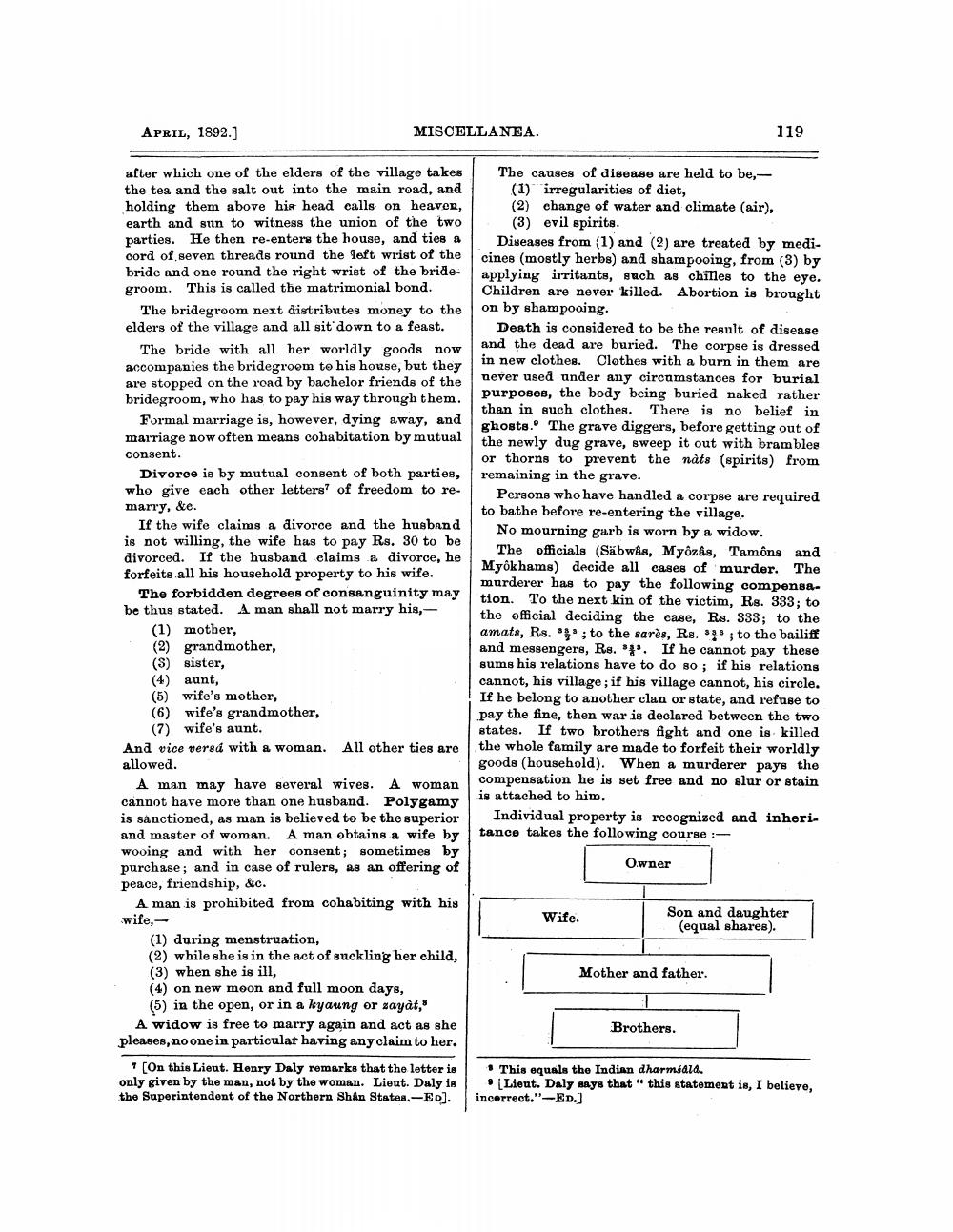________________
APRIL, 1892.]
MISCELLANEA.
119
after which one of the elders of the village takes The causes of disease are held to be, the tea and the salt out into the main road, and (1) irregularities of diet, holding them above his head calls on heaven, (2) change of water and climate (air), earth and sun to witness the union of the two (3) evil spirite. parties. He then re-enters the house, and ties a
Diseases from (1) and (2) are treated by medicord of seven threads round the left wrist of the
cines (mostly herbs) and shampooing, from (3) by bride and one round the right wrist of the bride- applying irritants, such as chilles to the eye. groom. This is called the matrimonial bond. Children are never killed. Abortion is brought
The bridegroom next distributes money to the on by shampooing. elders of the village and all sit down to a feast. | Death is considered to be the result of disease The bride with all her worldly goods now
and the dead are buried. The corpse is dressed accompanies the bridegroom to his house, but they
in new clothes. Clothes with a burn in them are
never used under any circumstances for burial are stopped on the road by bachelor friends of the bridegroom, who has to pay his way through them.
purposes, the body being buried naked rather
than in such clothes. There is no belief in Formal marriage is, however, dying away, and
ghosts. The grave diggers, before getting out of marriage now often means cohabitation by mutual
the newly dug grave, sweep it out with brambles consent.
or thorns to prevent the nats (spirits) from Divorce is by mutual consent of both parties, remaining in the grave. who give each other letters of freedom to re
Persons who have handled a corpse are required marry, &e.
to bathe before re-entering the village. If the wife claims a divorce and the husband
No mourning garb is worn by a widow. is not willing, the wife has to pay Rs. 30 to be
The officials (Säbwls, Myôzás, Tamôns and divorced. If the husband claims a divorce, he
Myökhams) decide all cases of murder. The forfeits all his household property to his wife.
murderer has to pay the following compensaThe forbidden degrees of consanguinity may
tion. To the next kin of the victim, Rs. 333; to be thus stated. A man shall not marry his,
the official deciding the case, Rs. 333; to the (1) mother,
amats, Rs.); to the sarès, Rs. 40; to the bailiff (2) grandmother,
and messengers, Rs.''. If he cannot pay these (S) sister,
sums his relations have to do so ; if his relations (4) aunt,
cannot, his village ; if his village cannot, his circle. (5) wife's mother,
If he belong to another clan or state, and refuse to (6) wife's grandmother,
pay the fine, then war is declared between the two (7) wife's aunt.
states. If two brothers fight and one is killed And vice vered with a woman. All other ties are the whole family are made to forfeit their worldly allowed.
goods (household). When a murderer pays the A man may have several wires. A woman
compensation he is set free and no alur or stain cannot have more than one husband. Polygamy
is attached to him. is sanctioned, as man is believed to be the superior Individual property is recognized and inheriand master of woman. A man obtains a wife by tance takes the following course :wooing and with her consent: sometimes by purchase; and in case of rulers, as an offering of
Owner peace, friendship, &c. A man is prohibited from cohabiting with his
Son and daughter wife,
Wife.
ti (equal shares). (1) during menstruation, (2) while she is in the act of suckling her child, (3) when she is ill,
Mother and father. (4) on new moon and full moon days,
(5) in the open, or in a kyaung or xayat," A widow is free to marry again and act as she
Brothers. pleases, no one in particular having any claim to her.
[On this Lieut. Henry Daly remarks that the letter is only given by the man, not by the woman. Lieut. Daly is the Superintendent of the Northern Shan States.-ED).
This equals the Indian dharmsaia.
(Lieut. Daly says that " this statement is, I believe, incorrect."-ED.]




